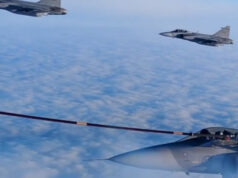Britain’s Chief of the Defence Staff has acknowledged that the Armed Forces are continuing to shrink by “about two to three hundred” personnel each month, but expressed cautious optimism that the trend is beginning to stabilise.
Admiral Sir Tony Radakin, appearing before the Public Accounts Committee on Monday, told MPs: “It continues to be a problem. I think we should acknowledge that. So the Armed Forces are getting smaller each month to the tune of about two to three hundred, but that decrease is getting considerably less than it has been over the last couple of years.”
He explained that the decline is not uniform across all services: “If you look at it through the lenses of the three services, the Navy has stabilised and is starting to get bigger now. The Air Force is reasonably stable, and then the Army is still on a downwards trajectory.”
However, he added that forecasts suggest “we will start to rise across the whole of the Armed Forces in the next two to three years.”
Radakin placed emphasis on recruitment reform, saying that while demand remains strong — “in the order of 13 people applying for every place” — conversion of applicants into recruits remains suboptimal. “We are not as strong as we should be… but we’re better than we used to be,” he said. To improve matters, he pointed to ongoing efforts to re-evaluate rigid entry standards: “We’ve looked again at some of the barriers, not to reduce the quality, or the competitiveness, but to allow more people to come forward.”
One area under scrutiny has been medical criteria. Radakin questioned whether the Armed Forces have been “too rigorous on medical standards that look at people as if everybody’s going to serve for a full career of 22 years, when on average most people it’s closer to 10 years.”
He said the government had implemented “about 100 variations” to medical standards last autumn, aiming to improve flexibility and remove unnecessary blocks to entry. “Can you look at someone’s medical prognosis maybe five years at a time?” he asked, arguing that such an approach “gives them a route in” and avoids disqualifying recruits over potential long-term issues that may never materialise.
The Admiral also underscored broader changes designed to boost retention and morale, including accommodation upgrades and improved starting salaries.
“We used to have a system whereby you were on a sort of, almost like a probationary wage for the first six months of your career… We’ve now brought that forward so that everybody joins on their substantial salary that you get in that first rank – that’s a huge increase, so that’s closer to £25,000 rather than £18,800.”
He concluded that the Armed Forces must do better at “treating people as individuals” and giving them “reasons to stay in”, highlighting that those who join do so to “serve their country” and “be developed during their time in service.”














The last point – absolutely spot on.
Recruitment is a problem; but it won’t be solved without retention. We need to give people a reason to stay.
I’ll give you an example of how my cohort were mismanaged by APC – all but two of us in my cap badge on promotion to Major were told – “because of the numbers, you will probably never command a company.”
Well, command is what everyone joined for and what we wanted to stay for. It was mind boggling as we were so short of Majors that most of us had already held acting rank and commanded a company. So most people promptly resigned. Two years later, the regiment was bringing in other cap badges to command companies because it didn’t have enough home grown (not to mention the gaps then left in the staff appointments).
Equally difficult to retain soldiers who have been promised flexibility, but then get let down. And of course, retention is a downward spiral. The disaffected leave, creating gaps. Those that stay have to plug those gaps and lose the flexibility they were promised and become disaffected …
The disaffected are a drain on morale too….
Google pay 92 every hour my last check was 8400 working 10 hours per week on the web. My more youthful sibling companion has been averaging 18k throughout recent months and he works around 24 hours per week. I cannot accept how simple it was once I attempted it out.This is my main thing……….,.,.,.. WORKSTAR1.COM
As a x member of Her majestys armed forces why would a young man offer up his life in service so that the government 20 30 40 50 years down the line is willingly going to through you under a bus for doing your duty .
That may have been your aggenda bobA but gues what .its probably beacause some people want to serve there country and get back stabbed by the same country that send them there did you ever think of that instead of oh poor me i didnt become a major ?
Kenneth, your lack of punctuation made that a very difficult read. I suggest you read my comment again.
Number one – this happened on promotion to Major. An entire cohort of future commanders (and as importantly staff officers) were essentially told “you won’t get command and by extension your career is going nowhere” when in fact that wasn’t actually true.
Given that the military can’t pay bonuses or increase pay for performance, the only carrot it really has is promotion, both for Officers and Soldiers. Very similar issues are experienced by NCOs. The result of mismanagement like that is a loss of experience (my entire cohort had done several tours of HERRICK and some of us TELIC too.) That loss of experience creates further gaps.
The only valid point you’ve made is the ‘stab in the back’ comment. So let’s ay it out rather than call it an ‘agenda’ Let’s use the example of an officer called “Bill” Bill was top of his platoon at RMAS. He was offered spots in both of his choice regiments and was in a fortunate position to choose. He won the binos on PCD (top student). ” days after completing training he was on ops in Iraq. After 4 months, he was told he’d have to take over a platoon in Helmand as the Pl Comd (his mate) had been injured. He then goes to Helmand for 3 months.
After 18 months he’s back in Helmand for six month tour as Coy 2IC. In between tours he spent 6 months at 48 hrs NTM on spearhead, meaning he couldn’t be more than two hours away from camp.
He then take sup a post as RSO (not a volunteer, but he broke his ankle on selection and that was the post available) – prepares for Helmand for a third time. Unit taken off the tour as part of the draw down. Instead he’s now posted to the other end of the country as Adjutant uprooting his young family, wife can’t return to employer at end of Maternity leave so they miss out on maternity pay and her salary.
Then he gets posted as Acting Major to Northern Ireland (another move) to command a support company. Has second kid. Pension is moved without any say to a new, less generous scheme. Pay reform comes in which will mean that in 3 years time he will be on a pay freeze until his promotion to Lt Col (so he’ll at a minimum spend 5 years on the same pay)
All the same, Bill is putting in hours, developing his soldiers, looking after their welfare and training hard. He’s been away for 9 months this year without deploying. His hard work seems to pay off, he’s been graded well and is told he’s promoting to substantive Major on his first look! Well done Bill!
But then the desk officer interviews him and drops the bomb shell, that because the Army needed him to promote this year, but last year they needed fewer people – he has one less senior Captain report than most people do as a result, he and other like him, have promoted “in the bottom third” – so from top 10% in a cohort automatically into the bottom third. As a result, Bill is unlikely to qualify to command a company – and that means he will probably never promote again. On the new pension scheme he is now at least 10 years away from pensionable length of service.
So when you talk about a stab in the back – there’s an example for you…. multiple tours, in combat for your country, moved your family which results in financial penalty. Work your socks off to better the lives of your soldiers, to improve your personal knowledge, skills and experience to be told “it pretty much ends here…”
If you think that is “Woe is Me!” Kenneth, then fine. You’ll probably never get it.
Thank you for wrting that and the decades of service behind it.
It’s unfortunate that those at the top of politics and holders of the purse strings will also never get it. Until a canny politician comes along and works out how to make soldier numbers win votes it won’t be top priority.
APC is an archaic relic from a long gone jolly boys past. It should have been got rid of at least a decade ago. I’m surprised no one has taken them and the whole board system to an employment tribunal yet and made out like a bandit.
Bloke who can run fast and organised a mess do once = promote
Bloke doing a uni degree in his spare time = dev dev better luck in next year or the year after pal.
Joke of a system that no one on civvie street can get their heads around when you tell them yes that is how it works, they thought I was pulling their legs.
APC destroys blokes career I have been effectively told no mater what I do I will never progress no matter what my reports say, at the same time I watch other less skilled individual promote due to a trade they chose 15 years ago and don’t do. Now I am looking at the exit because I value myself more than APC does.
What is APC?
To take a silver lining from a particularly shitty grey cloud, the UK labour market is absolutely boned beyond belief, especially for young people. That should make for a far more fertile hunting ground for UKAF, and be far better/more valuable for young people that working almost any other job in their late teens and early 20s
Ah yes, but “they won’t get out of bed for less than £40k…”
After 24 yrs service, nor should they
Hmm unemployment is only 4.4% hardly boned but it was 11% when I joined up that’s boned.
If that’s the unemployment rate it is close to what is considered full employment by economists which is 4%. That is because a rate of 4% is deemed to represent natural fluctuations in the labour market such as people transitioning between jobs or industries or new graduates looking for their first job.
With unemployment this low, the forces are competing with every other industry that is short of labour.
It depends on what they count as employed, those numbers include people working part-time, people on zero hour contracts, full time students and unpaid carers (I believe). The statistics are easily manipulated.
Some of the Army loss is due poor equipment etc and no tours any more on top of pay etc. Not saying start a war but some like tours they give a soldier a chance prove them self and be tested which some do enjoy. There is no simple one reason i know but boredom, lack working kit does not help. Plus its all negitive news about the Army, empty promises on kit orders and numbers housing etc.
Indeed
Army’s not very digital environment as well as the lack of interesting stuff to do is a big problem.
If you keep people busy and busting around they are generally happier – provided it is purposeful….
Plenty of tours for those willing to put the work in.
You don’t think they see Russians/Ukrainians dying horrible deaths due to FPV drones are having a factor? Getting plastered all over social media etc.
It’s definitely harder than ever before to maintain the rhetoric that war is some sort of adventure and not a horrific nightmare. I can watch videos of people getting hit by glide bombs while I eat my breakfast, even just 15 years ago that wasn’t feasible.
Nothing better to help with retention than sitting in a massive garrison in the middle of nowhere. When we had barracks all over the place at least there was a bit of variety.
Why not recruit more Gurkhas into the army , very loyal and fierce soldiers .
I believe that is happening with the new “King’s Gurka Artillery” unit. But we also need domestic recruitment.
Lack of support from government when you leave is a problem. Why would anyone join these days to maybe end up destitute!! It wasn’t always like that when I left in 93.
Physical fitness whilst still very important for many roles, such as the obvious infantry etc, is becoming increasingly less important for non frontline roles. And there should still be minimum standards. But to exclude people for the range of bizzare reasons we all know about is bordering on ludicrous in the current recruitment environment.
If someone’s job is to mainly analyse intelligence imagery, and they are, or have the have the potential to be, really good at it; and they are extremely enthusiastic about it, then disqualifying them because of acne or other relatively minor and manageable conditions seems odd. My wife convinced a doctor to give me an over the phone diagnosis of asthma, without my knowledge or consent (she thought she was doing me a favour), but that could well lead to a ‘computer says no’ moment within the current process (if I ever did get around to applying for the reserves).
The UK’s population pyramid isn’t too favourable when considering recruitment prospects, though not as bad as many other countries. So we need to let a higher proportion of those willing to serve do so, otherwise we simply won’t be able to muster the manpower needed. The skill sets required within the forces has also changed significantly in some areas since many of these recruitment policies and standards were set.
Yes ukraine war has shown physical fitness is only a priority for combat infantry and even then do you really have to be able to run 8 miles in full combat gear , though obviously a big plus . And let’s be honest in time of war fitness picks up . Israel has recently shown how good all female tank crews are . So why not have all female tank crews , female x3 crew in an Ajax , female artilery gunners . Time to think outside the box abit and be more modern . Its obviously much better to have places filled with not so fit people of normal intelligence than no one at all .
Maybe they should stop the diversity hiring like the RAF got found out over. If white males want to apply let them and pick the best person regardless. Ruling out the demographic most likely to join up is stupid.
If you think Drone Crews don’t need to be fit, or artillery crews, or mechanics working in sparse forward workshops, I have some uncomfortable news for you. (And t hat’s not saying that women can’t be physically fit or robust enough). But the idea that physical fitness isn’t a priority is a bit bunk.
Well a big problem is how the country is ran if it were ran better and had a good leader who loves the people in it more people would put their lives on the line but at the moment what are we fighting to protect its not a uk problem its a europe wide problem
Same old same old yawn yawn……….
Alot of young people myself included believe the uks army isn’t the uk but Americans we need to distance ourselves from America so we feel like we’re fighting for our country not America
A big issue, maybe some aren’t aware,the cut backs to the support staff ( civil servants) has left gaping holes. The only option is to use uniforms to cover those posts. This isn’t what they signed up for ,the get pissed off and leave